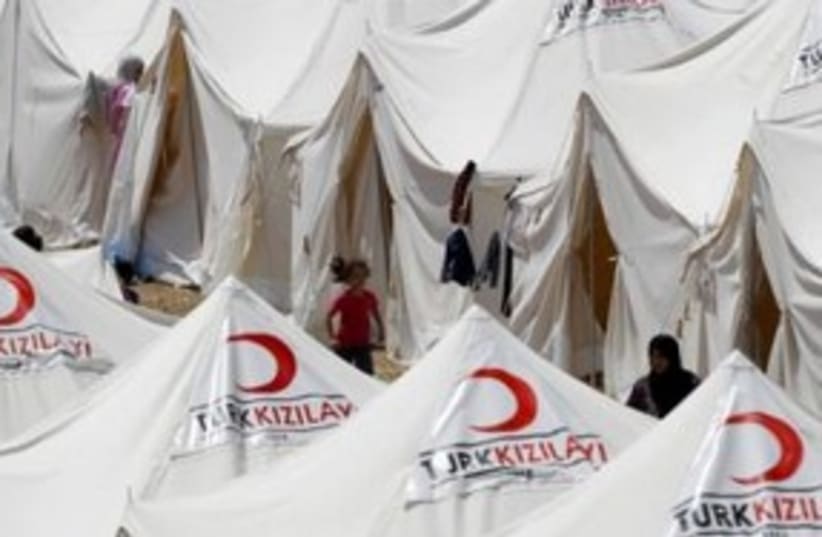RELATED:Seven protesters killed in Syria during pro-Assad ralliesSyria forces sweep Aleppo as Assad promises reformSunni Turkey has become increasingly critical of Assad, from Syria's Alawite minority, an offshoot of Islam, after previously backing him in his drive to seek peace with Israel and improve relations with the United States. Assad also opened the Syrian market to Turkish goods.A Turkish Red Crescent official told reporters about 600 Syrians had crossed the border on Thursday morning."They (refugees) are running in panic. They have seen what happened to their villages," said one refugee, a farmer from the Jisr al-Shugour area who gave his name as Maan.He was referring to a scorched earth military campaign in the arable hill region southwest of Aleppo, during which rights groups say Syrian security forces have killed more than 130 civilians and arrested 2,000. Some 1,300 civilians have been killed across Syria since mid-March, they added.Protests grow near Turkish borderProtests have grown in northern areas bordering Turkey following military assaults on towns and villages in the Jisr al-Shughour region of Idlib province to the west of Aleppo that had sent more than 10,000 fleeing to Turkey.On the 100th day of an uprising that has posed the gravest challenge to Assad's rule, soldiers and secret police backed by armored vehicles set up road blocks on Wednesday along the main road from Aleppo to Turkey, a major route for container traffic from Europe to the Middle East. They arrested tens of people in the Heitan area north of Aleppo, residents said.Central neighborhoods of Aleppo, a largely Sunni city with a significant minority population, have been mostly free of protests, in part due to a heavy security presence and a continuing alliance between Sunni business families and Syria's ruling Alawite hierarchy.The United Nations High Commissioner for Refugees said that since June 7, some 500-1,500 people had fled daily across Syria's 840-km (520-mile) border with Turkey.Ban Ki-moon casts doubts on Assad's credibilityTurkey had warned Assad against repeating mass killings in cities witnessed during the rule of his father in the 1980s. A senior Turkish official said on Sunday that Assad had less than a week to start implementing long-promised political reforms before foreign intervention began, without elaborating.Syria's Foreign Minister Walid al-Moualem on Wednesday played down any possibility of international intervention against his country. He asked Turkey to reconsider its response to a speech this week by Assad in which Turkish President Abdullah Gul said Assad's promises of reforms were not enough.In his third speech since the start of the uprising, Assad promised reforms but these were seen by opponents and world leaders as too little, too late and too vague.Assad issued an amnesty the next day, which human rights lawyers said covered mainly drug dealers, tax evaders and thieves across Syria.U.N. chief Ban Ki-moon said Assad was running low on credibility, after his pledges for reform and engaging in dialogue with pro-democracy protesters had yet to bear fruit.
Syrian troops near Turkish border, refugees flee
Hundreds of Syrian refugees cross into Turkey; troops storm village near border; Syrian foreign minister plays down international pressure.

RELATED:Seven protesters killed in Syria during pro-Assad ralliesSyria forces sweep Aleppo as Assad promises reformSunni Turkey has become increasingly critical of Assad, from Syria's Alawite minority, an offshoot of Islam, after previously backing him in his drive to seek peace with Israel and improve relations with the United States. Assad also opened the Syrian market to Turkish goods.A Turkish Red Crescent official told reporters about 600 Syrians had crossed the border on Thursday morning."They (refugees) are running in panic. They have seen what happened to their villages," said one refugee, a farmer from the Jisr al-Shugour area who gave his name as Maan.He was referring to a scorched earth military campaign in the arable hill region southwest of Aleppo, during which rights groups say Syrian security forces have killed more than 130 civilians and arrested 2,000. Some 1,300 civilians have been killed across Syria since mid-March, they added.Protests grow near Turkish borderProtests have grown in northern areas bordering Turkey following military assaults on towns and villages in the Jisr al-Shughour region of Idlib province to the west of Aleppo that had sent more than 10,000 fleeing to Turkey.On the 100th day of an uprising that has posed the gravest challenge to Assad's rule, soldiers and secret police backed by armored vehicles set up road blocks on Wednesday along the main road from Aleppo to Turkey, a major route for container traffic from Europe to the Middle East. They arrested tens of people in the Heitan area north of Aleppo, residents said.Central neighborhoods of Aleppo, a largely Sunni city with a significant minority population, have been mostly free of protests, in part due to a heavy security presence and a continuing alliance between Sunni business families and Syria's ruling Alawite hierarchy.The United Nations High Commissioner for Refugees said that since June 7, some 500-1,500 people had fled daily across Syria's 840-km (520-mile) border with Turkey.Ban Ki-moon casts doubts on Assad's credibilityTurkey had warned Assad against repeating mass killings in cities witnessed during the rule of his father in the 1980s. A senior Turkish official said on Sunday that Assad had less than a week to start implementing long-promised political reforms before foreign intervention began, without elaborating.Syria's Foreign Minister Walid al-Moualem on Wednesday played down any possibility of international intervention against his country. He asked Turkey to reconsider its response to a speech this week by Assad in which Turkish President Abdullah Gul said Assad's promises of reforms were not enough.In his third speech since the start of the uprising, Assad promised reforms but these were seen by opponents and world leaders as too little, too late and too vague.Assad issued an amnesty the next day, which human rights lawyers said covered mainly drug dealers, tax evaders and thieves across Syria.U.N. chief Ban Ki-moon said Assad was running low on credibility, after his pledges for reform and engaging in dialogue with pro-democracy protesters had yet to bear fruit.